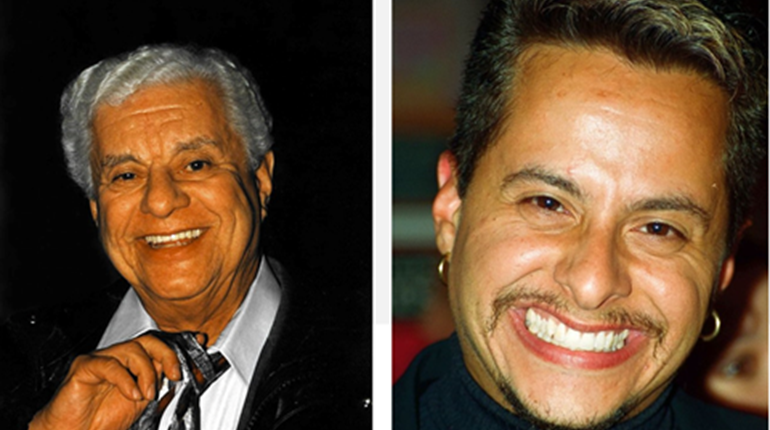Ernest Antony Puente Jr., better known as Tito Puente, “The King of Latin Music,” or simply, “El Rey” (The King), was born in Spanish Harlem, New York in 1923. He first began playing the timbales, the instrument that would make him famous, at the young age of 13. Not long after, he began playing professionally in Afro-Cuban bands, which led him to a variety of opportunities, including moving to Miami, Florida, in 1938 to play with José Burbelo’s orchestra before returning to his birth state to play with Machito’s Orchestra in 1941. Puente joined the Navy during World War II, where he taught himself saxophone and led a band. After three years with the Navy, he used the G.I. Bill to attend Juilliard, studying composition and orchestration (arranging musical parts for bands and orchestras). His conservatory training and early professional experiences playing in Afro-Cuban bands served him well, making him an accomplished composer, arranger, band leader, and multi-instrumentalist.
Puente then founded his own band, The Piccadilly Boys, in 1949. With this group, Puente became a headliner for the Palladium Ballroom, alternating nights with the other headlining acts, Machito and His Afro-Cubans and, later, Tito Rodríguez’s orchestra. It is here he became known as one of the kings of mambo, a style that utilizes a jazz big band with an Afro-Cuban percussion section blending jazz influences with driving rhythms and fast, energetic playing.
His career was revitalized in the 1970s, first when Santana covered his hit, “Oye Como Va,” and then with the rise of salsa music. He became a central leader of the salsa movement and recorded with some of its greatest stars, including Celia Cruz and the Fania All-Stars. Puente continued to tour and perform throughout the 1980s and 1990s until his death in 2000. He produced an astonishing 117 albums and earned six Grammy wins, a Lifetime Achievement Award, the National Medal of the Arts from President Bill Clinton, a star on the Hollywood Walk of Fame, an induction into the International Jazz Hall of Fame, a Smithsonian Institution James Smithson Bicentennial Medal, and numerous honorary degrees from institutions including Berklee College of Music and Columbia University. Additionally, Tito Puente Street in Miami was named in his honor.
Tito Puente’s legacy lives on in Florida through his son, Tito Puente Jr., who settled in southern Florida as a young adult, where he still resides. As a teenager he toured with his father, first as a spectator and later onstage with him. As a result, he cites his father as his greatest musical influence. Throughout his life, he has sought to keep his father’s legacy alive. While he still plays his father’s music, he has put his own spin on it and created his own unique sound, including the addition of electronic musical influences. Puente Jr. maintains a busy touring schedule, performing at jazz festivals, concert halls and casinos alike, reaching a broad audience of Latin dance and jazz enthusiasts. He has also released a series of albums, including Got Mambo? (2010) and En los pasos de my padre (In My Father’s Shoes) (2004), which went on to become a BET jazz television special of the same name. Puente Jr. also collaborated with Machito Jr. and Tito Rodriguez Jr. on The Big 3 Palladium Orchestra, a tribute band to their fathers, the three great headliners of the Palladium. Today, Puente Jr. continues to tour and play music all over his home state of Florida and across the United States, fusing his father’s legacy with his own sound everywhere he goes.
